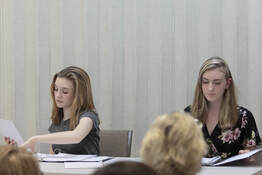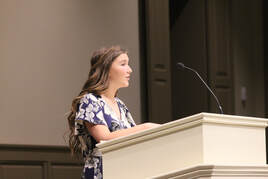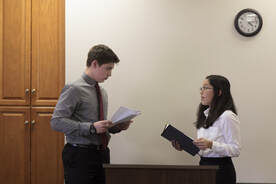Speech and Debate
Each year, ALC's elementary, middle school, and high school students participate in two annual oral presentations. The upper elementary and lower middle school students prepare and deliver two speeches: one culminating each of the fall and spring trimesters. Speech genres include oral story-telling, expository speeches, oral interpretation of literature, and more.
The upper middle school and high school students deliver a speech at the end of the fall trimester, with speech genres changing each year, and participate in formal debate at the end of the spring trimester. Formal debate, in particular, furthers ALC's vision of transformative education by incorporating the following:
Debate preparation is integrated with the research writing that occurs every spring trimester. Debate topics focus on a resolution that is both relevant and tied thematically to the current year's history course of study. For instance, one high school resolution was: "Resolved: In a democracy, civil disobedience is an appropriate weapon in the fight for justice." Students research the topic and come to the debate prepared to argue both sides of the resolution.
The upper middle school and high school students deliver a speech at the end of the fall trimester, with speech genres changing each year, and participate in formal debate at the end of the spring trimester. Formal debate, in particular, furthers ALC's vision of transformative education by incorporating the following:
- Critical reflection
- Testing new means through rational discourse
- Collecting accurate and complete information
- Ability to weight evidence
- Ability to assess arguments
- Dialogue and collaboration
Debate preparation is integrated with the research writing that occurs every spring trimester. Debate topics focus on a resolution that is both relevant and tied thematically to the current year's history course of study. For instance, one high school resolution was: "Resolved: In a democracy, civil disobedience is an appropriate weapon in the fight for justice." Students research the topic and come to the debate prepared to argue both sides of the resolution.


